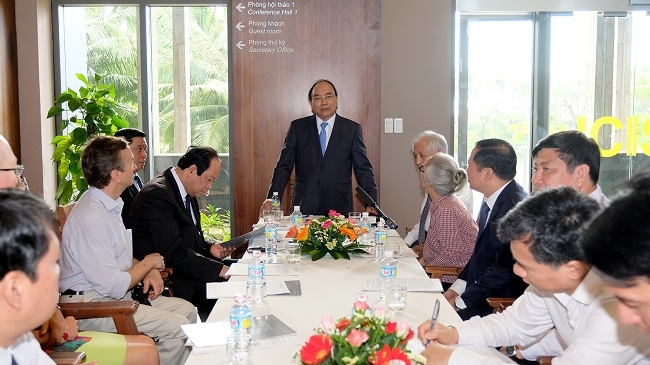
Prime Minister Nguyen Xuan Phuc has agreed in principle a plan to build the south central province of Binh Dinh into a scientific and educational urban area when visiting the International Centre for Interdisciplinary Science and Education (ICISE) on May 6.
PM
Nguyen Xuan Phuc addressing a working session with ICISE scientists. (Photo:
VGP)
This is a brave and pioneering step which helps to
gather renowned scientists around the world, thus contributing to promoting the
nation’s science, PM Phuc told ICISE scientists.
He stressed the importance of science and technology, including basic
and applied sciences, in the country’s development.
The Government leader spoke highly of the achievements of the ICISE,
particularly in holding major international scientific events.
In the context that the fourth Industrial Revolution is posing both
opportunities and challenges to Vietnam,
ICISE should grow more sustainably and effectively in order to foster the
country’s basic science researches and improve its human resources.
Emphasising the importance of applying scientific achievements in
economic development, PM Phuc said he hopes the centre will work to speed up
the application of science technology in the reality.
He also requested the centre to create a better environment to attract
more scientists, and connect more closely with universities and fundamental
science centres, both inside and outside the country.
The leader required the Ministry of Science and Technology, the Vietnam
Academy of Sciences, and Binh Dinh province to create favourable conditions to
bring into full play the intelligence of ICISE scientists.
ICISE was founded by Prof. Jean Tran Thanh Van and his wife, Prof. Le
Kim Ngoc, in 2013. Since then, the centre has held 40 international symposiums,
with the participation of over 3,500 scientists, including 12 Nobel winners.
Earlier, PM Nguyen Xuan Phuc visited the Science Centre
(ExploraScience) and was briefed about the Quy Nhon Innovative Valley
project.
Source: NDO
In the spirit of "Party members go first, the people follow”, all households of Party members in the Doan Ket sub-region in Da Bac town, Da Bac district, voluntarily removed gates and fences, and donated land when the road expansion project passed through their properties. Inspired by their example, 68 households in the sub-region quickly followed suit, contributing over 1,400 sq.m of residential and perennial cropland to widen the main road through the residential area. The exemplary role of Party members in Doan Ket stands as a shining example of studying and following President Ho Chi Minh’s thought, morality, and lifestyle.
The Hoa Binh provincial People's Committee held a monthly meeting on May 29 to assess the implementation of socio-economic development tasks in the first six months of 2025, the progress of key projects, and some other important issues.
During his lifetime, President Ho Chi Minh always expressed his deep affection and special concern for children and youth. He once emphasized: "Caring for and educating children well is the responsibility of the entire Party and the entire people”; "First of all, the family (i.e. grandparents, parents, siblings) must do this job well”. "the Party Committees…, the Children’s Committee, the Youth Union, the education sector, and all related organizations must have specific plans to ensure children grow healthier and more progressive”. His teachings has been remaining valuable and serving as the guiding principles in the work of protecting, caring for, and educating children. In line with this ideology, Hoa Binh Province has continuously been prioritizing and investing resources in the well-being of children in recent years.
Mr. Nguyen Phi Long, the alternate Member of the Party Central Committee and Secretary of the Provincial Party Committee chaired the meeting of the Standing Committee of the Provincial Party Committee to provide opinions on several investment projects within the province. There was the attendance of Ms. Bui Thi Minh, the Permanent Deputy Secretary of the Provincial Party Committee and Chairwoman of the Provincial People’s Council; Mr. Bui Đuc Hinh, the Deputy Secretary of the Provincial Party Committee and Chairman of the Provincial People’s Committee and other members of the Standing Committee; the leaders from other departments, agencies, and some localities.
The Standing Board of the Vietnam Fatherland Front (VFF) Committee of Hoa Binh province held a meeting on May 28 to honour outstanding village elders, village heads, and reputable individuals from local ethnic minority and religious communities.
In mid-May, the provincial Museum organised an exhibition named "Duoi la co Dang Cong san Viet Nam quang vinh” (Under the flag of the glorious Communist Party of Vietnam). This meaningful activity took place in the joyful atmosphere to celebrate the country's major holidays and the Party congresses at all levels for the 2025-2030 term, towards the 14th National Party Congress.


